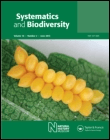
SYSTEMATICS AND BIODIVERSITY
Scope & Guideline
Advancing the frontiers of ecological and evolutionary research.
Introduction
Aims and Scopes
- Taxonomic Research:
The journal publishes studies that involve the classification and naming of species, aiming to clarify the existing taxonomic frameworks and resolve ambiguities in species identification. - Phylogenetics and Evolutionary Biology:
Research focusing on the evolutionary relationships among species through phylogenetic analyses is a core area. This includes molecular and morphological approaches to elucidate the evolutionary history of taxa. - Biodiversity Assessment:
The journal emphasizes the importance of documenting biodiversity, particularly in under-studied regions, and highlights the need for integrative approaches to uncover hidden diversity. - Conservation Biology:
Papers that address conservation issues, including species at risk and habitat preservation, are central to the journal's mission, reflecting the urgent need for biodiversity conservation. - Integrative Taxonomy:
The use of multiple lines of evidence, including molecular, morphological, and ecological data, to define species and understand their distributions is a significant focus, promoting a holistic view of biodiversity.
Trending and Emerging
- Molecular Phylogenetics:
There is a significant increase in the number of studies employing molecular techniques to resolve phylogenetic relationships, reflecting a broader trend in systematic biology towards genetic data as a primary tool for understanding biodiversity. - Cryptic Species Diversity:
The recognition of cryptic species—those that are morphologically similar but genetically distinct—is becoming a prominent theme. This underscores the journal's commitment to uncovering hidden biodiversity, which has important implications for conservation. - Integrative Approaches to Taxonomy:
The integration of molecular, morphological, and ecological data is increasingly emphasized, showcasing a trend towards comprehensive analyses that provide a more nuanced understanding of species diversity and relationships. - Conservation-Related Research:
Research addressing conservation issues, particularly regarding species at risk and habitat loss, is gaining prominence, highlighting the journal's alignment with global conservation priorities. - Biogeography and Evolutionary History:
Studies that explore the biogeographical patterns and evolutionary history of species are increasingly featured, reflecting a growing interest in understanding how historical factors influence current biodiversity.
Declining or Waning
- Traditional Morphological Taxonomy:
While morphological studies remain relevant, there is a noticeable shift towards molecular approaches, leading to a decline in purely morphological taxonomic papers. This trend may indicate a growing preference for integrative methods that combine various data types. - Regional Studies with Limited Scope:
Research focusing on very localized or specific taxa without broader implications for biodiversity or conservation is becoming less frequent. The journal seems to favor studies that have wider ecological or evolutionary significance. - Historical Taxonomic Reviews:
Papers that primarily review historical taxonomic classifications without providing new insights or data are less common. The journal appears to prioritize novel contributions that advance understanding of biodiversity rather than retrospective analyses.
Similar Journals
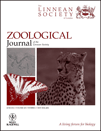
ZOOLOGICAL JOURNAL OF THE LINNEAN SOCIETY
Championing scholarly excellence in zoological studies.Zoological Journal of the Linnean Society, published by Oxford University Press, stands as a prestigious vessel for scholarly discourse in the fields of Animal Science and Ecology. With an ISSN of 0024-4082 and E-ISSN 1096-3642, this journal has an illustrious history dating back to its inception in 1866, and has consistently contributed groundbreaking research that shapes our understanding of zoology and evolutionary biology. Operating out of the United Kingdom, the journal boasts an impressive Q1 ranking in both Animal Science and Zoology and Ecology, Evolution, Behavior and Systematics, positioning it among the top tier of its category. With a significant presence in the academic landscape, the journal ranks 24th among 490 in Animal Science and 97th among 721 in Ecology, reflecting its impact and relevance in the field. Although it is not an open access journal, the wealth of knowledge it offers is invaluable for researchers, professionals, and students alike, aiding in the advancement of zoological sciences.

European Journal of Taxonomy
Advancing biodiversity knowledge through open access.The European Journal of Taxonomy is a distinguished open access journal, published by the MUSEUM NATL HISTOIRE NATURELLE in France, dedicated to the rich and dynamic field of taxonomy, ecology, and systematics. Since its inception in 2011, this journal has aimed to provide a platform for the dissemination of high-quality research and innovative methods relevant to the study of biodiversity and species classification. With a commendable Q2 ranking in the Ecology, Evolution, Behavior and Systematics category as of 2023, the journal ranks 380 out of 721 in Scopus, highlighting its pivotal role in advancing scientific knowledge in these essential areas. Researchers and students alike will find valuable resources and contributions that address pressing ecological and evolutionary questions from 2015 to 2024. By promoting open access, the European Journal of Taxonomy ensures that vital research is accessible to a broader audience, fostering collaboration and discourse among professionals striving to enhance our understanding of the natural world.
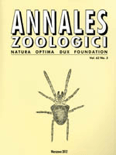
ANNALES ZOOLOGICI
Unveiling the Mysteries of Ecology and EvolutionANNALES ZOOLOGICI is a distinguished academic journal published by the Museum & Institute of Zoology, Polish Academy of Sciences, based in Warsaw, Poland. With a long-standing tradition in zoological research, this journal has evolved to encompass a diverse range of studies in ecology, evolution, behavior, and systematics, aiming to foster a deeper understanding of animal biology and conservation. It holds a commendable Q2 classification in the 2023 Ecology, Evolution, Behavior and Systematics category, indicating its significant contribution to the field. Although ANNALES ZOOLOGICI is not an open-access publication, it remains accessible to a global audience of researchers, professionals, and students aiming to advance their knowledge and engage with cutting-edge zoological findings. As of 2024, this journal continues to be a vital resource for those eager to explore the complexities of animal life and contribute to ongoing discussions within this essential scientific discipline.

KOREAN JOURNAL OF PLANT TAXONOMY
Shaping the future of plant sciences through impactful research.Korean Journal of Plant Taxonomy, published by the Korean Society of Plant Taxonomists, serves as a pivotal platform for researchers and professionals in the fields of plant taxonomy and ecology. With an ISSN of 1225-8318 and a burgeoning E-ISSN of 2466-1546, this journal aims to disseminate high-quality research that contributes to our understanding of plant species diversity, classification, and evolution. Spanning the years from 2018 to 2024, the journal finds its niche within Q3 rankings in both Ecology, Evolution, Behavior and Systematics and Plant Science, reflecting its impactful contributions and relevance in the academic community. The journal's scope encompasses various studies aimed at advancing plant taxonomy in South Korea and globally. By fostering collaboration and sharing groundbreaking research, the Korean Journal of Plant Taxonomy plays a crucial role in shaping the discourse in plant sciences, making it an invaluable resource for students, researchers, and professionals alike, committed to advancing knowledge in this dynamic field.
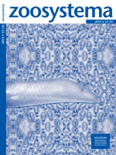
ZOOSYSTEMA
Unraveling the Mysteries of EcologyZOOSYSTEMA is a prestigious academic journal published by PUBLICATIONS SCIENTIFIQUES DU MUSEUM, PARIS, specializing in the fields of Animal Science, Zoology, and Ecology. With a focus on advancing the understanding of biodiversity and evolutionary processes, this journal serves as a vital platform for researchers to disseminate significant findings and foster discussions within the scientific community. Boasting an impressive categorization in the Q2 Quartile rankings for both its primary fields, ZOOSYSTEMA is recognized for its impact and quality, as indicated by its notable positions in the Scopus rankings. While currently not Open Access, the journal provides essential insights and comprehensive reviews across its volumes published since 1998, making it a cornerstone in zoological and ecological research. Researchers, professionals, and students alike will find ZOOSYSTEMA an invaluable resource for understanding complex biological systems and their interrelations, contributing to informed conservation and management efforts globally.

Arthropod Systematics & Phylogeny
Illuminating the path of arthropod evolution and diversity.Arthropod Systematics & Phylogeny is a pivotal journal published by the SENCKENBERG NATURHISTORISCHE SAMMLUNGEN DRESDEN, MUSEUM TIERKUNDE in Germany, dedicated to advancing the understanding of arthropod systematics, phylogenetics, and evolutionary biology. With an ISSN of 1863-7221 and an E-ISSN of 1864-8312, this journal has established itself as a reputable source for high-quality research, evident by its ranking in the Q1 category for Insect Science and Q2 in Genetics. Covering a spectrum of subjects within the realms of agricultural and biological sciences, it caters to a diverse audience of researchers, professionals, and students eager to explore the intricate relationships and evolutionary histories of diverse arthropod taxa. The journal has been consistently publishing impactful studies since its inception in 2009, with ongoing contributions expected to bolster its presence in the academic community through 2024 and beyond. Although it currently does not offer open access options, its rich content serves as a valuable resource for those passionate about entomology and genetics, fostering collaboration and innovation in an important area of biological research.

ORGANISMS DIVERSITY & EVOLUTION
Connecting Ideas: The Pulse of Evolutionary ResearchOrganisms Diversity & Evolution is a premier academic journal published by Springer Heidelberg, dedicated to advancing the fields of ecology, evolution, behavior, and systematics. Established in 2001 and continuing through 2024, this journal plays a crucial role in disseminating high-quality research that explores the complexities of biological diversity and evolutionary processes. With a commendable 2023 Scopus ranking of #253/721 in its category, placing it in the 64th percentile, and categorized in the Q2 quartile for Ecology and Evolution, it consistently attracts contributions from leading scientists and researchers worldwide. Although it operates on a subscription basis, the journal's rigorous peer-review process and dedication to impactful scientific discourse make it an invaluable resource for academics, practitioners, and students keen on understanding the intricate relationships that shape our biodiversity. By highlighting innovative research and fostering discussions on urgent ecological challenges, Organisms Diversity & Evolution serves as a vital platform for those committed to conservation and evolutionary biology.
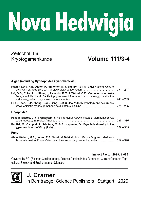
NOVA HEDWIGIA
Empowering Researchers to Shape the Future of EcologyNOVA HEDWIGIA is a premier journal dedicated to the fields of ecology, evolution, behavior, and systematics, as well as plant sciences. Published by GEBRUDER BORNTRAEGER in Germany, this journal serves as a vital platform for researchers, professionals, and students seeking to disseminate and engage with high-quality studies and findings. With an ISSN of 0029-5035 and an E-ISSN of 2363-7188, NOVA HEDWIGIA has established its significance within these disciplines, reflected in its current Scopus rankings, which place it in the third quartile of both ecology and plant science categories. This esteemed publication has contributed to the advancement of knowledge and innovation since its inception in 1993, continuing through 2024, offering valuable resources for an ever-evolving academic landscape. Researchers looking to contribute to ecological studies or plant sciences will find NOVA HEDWIGIA an ideal venue for sharing their work, nurturing their academic pursuits, and joining a community passionate about the natural sciences.
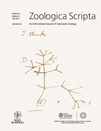
ZOOLOGICA SCRIPTA
Championing impactful studies in ecology and behavior.Zoologica Scripta, published by Wiley, stands as a distinguished journal within the fields of Animal Science and Zoology, Ecology, Evolution, Behavior and Systematics, Genetics, and Molecular Biology. With its inception dating back to 1971 and a convergence year extending to 2024, this journal consistently provides a platform for high-quality research, earning a Q1 ranking in two key categories and solid performance in additional fields, as evidenced by its significant Scopus rankings and impressive percentiles. Notably, it ranks 36 out of 490 journals in Animal Science and Zoology, placing it in the 92nd percentile. While Zoologica Scripta operates under a traditional access model, its rigorous peer-review process ensures that only the most impactful studies make their way into its pages. With a focus on advancing our understanding of biodiversity and evolutionary processes, this journal is indispensable for researchers, professionals, and students committed to the ongoing exploration of animal sciences and ecological studies.
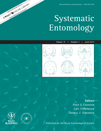
SYSTEMATIC ENTOMOLOGY
Pioneering Research in Insect Ecology and EvolutionSYSTEMATIC ENTOMOLOGY is a premier journal published by Wiley, specializing in the field of entomology with a particular focus on insect systematics, ecology, evolution, and behavior. With its strong academic reputation, this journal has achieved a remarkable Q1 ranking in both Ecology, Evolution, Behavior and Systematics and Insect Science categories, affirming its influence and importance in advancing research in these critical areas. SYSTEMATIC ENTOMOLOGY has a broad scope, making it a valuable source for original research, reviews, and methodological advancements that contribute to the understanding of insect biodiversity and systematics. Operating from the United Kingdom, the journal is dedicated to fostering knowledge and innovation within the scientific community, ensuring that high-quality research is accessible to researchers, professionals, and students alike. The journal's consistent publication since 1976 and its continued relevance up to 2024 exemplify its commitment to the field and its readers.